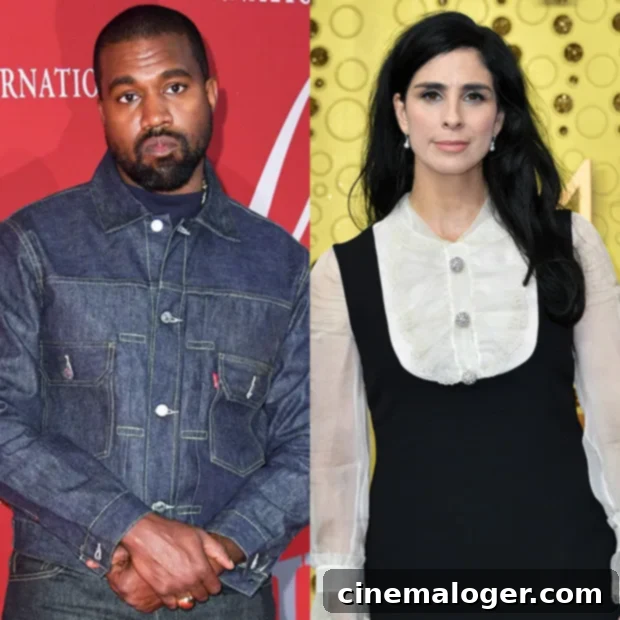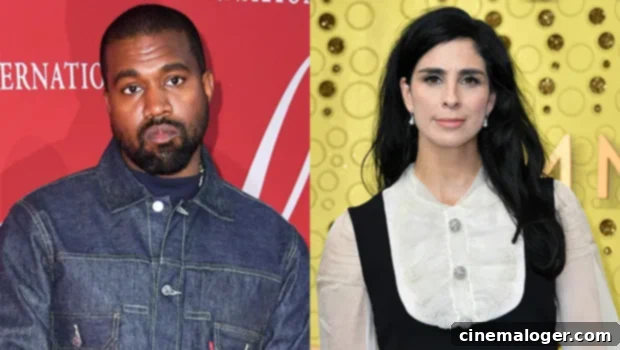Kanye West’s Escalating Antisemitism Controversy: Unpacking the Backlash, Social Media Bans, and His Defiant Stance
The controversial rapper, producer, and fashion designer, Kanye West, also known as Ye, ignited a firestorm of criticism across social media and the entertainment industry following a series of antisemitic remarks. These statements, particularly a now-deleted tweet, quickly led to his temporary deactivation from major platforms like Twitter and Instagram, prompting widespread condemnation from celebrities, advocacy groups, and the public alike. The incident not only highlighted the pervasive issue of hate speech online but also sparked a critical discussion about accountability for public figures and the real-world implications of their words.
Adding further fuel to the controversy, Ye expressed no remorse for his inflammatory comments during a subsequent interview with Piers Morgan. On October 19, 2022, a preview for the upcoming special revealed Kanye’s unyielding stance. When Piers Morgan, 57, directly asked, “Are you sorry you said it?” Kanye emphatically replied, “No. Absolutely not.” Morgan pressed the issue, challenging Ye by asserting that his tweet, which disturbingly declared an intention to go “death con 3 [sic] On JEWISH PEOPLE,” was undeniably racist. Unapologetically, Kanye declared, “Yeah, that’s why I said it,” doubling down on his harmful rhetoric and showcasing a profound lack of understanding or concern for the gravity of his words. This interview segment solidified the perception of Ye’s defiance and his unwillingness to acknowledge the pain and danger his remarks inflict upon the Jewish community.
The saga began after a tumultuous week marked by his “White Lives Matter” designs showcased at Paris Fashion Week, which drew its own significant share of criticism. However, it was his antisemitic tweet on a Saturday that truly propelled him into an international outcry. His remarks immediately triggered a wave of backlash from prominent figures such as comedian Sarah Silverman and acclaimed actress Jamie Lee Curtis, alongside influential organizations dedicated to combating hate, most notably the Anti-Defamation League.

Ye’s original tweet contained a menacing warning, stating his intention to go “death con 3 [sic] On JEWISH PEOPLE.” The phrase “death con 3” is a clear misspelling of DEFCON 3, a military alert status, yet its menacing intent was unmistakable. He further adopted a conspiratorial tone, asserting, “You guys have toyed with me and tried to black ball anyone whoever opposes your agenda.” This deeply disturbing and threatening tweet, which echoed classic antisemitic tropes of Jewish control and manipulation, swiftly led to his account being locked for violating Twitter’s stringent policies against hate speech and incitement to violence. A Twitter spokesperson confirmed the account’s suspension to the media, underscoring the platform’s commitment to enforcing its terms of service.
The Anti-Defamation League (ADL), a leading organization fighting antisemitism, responded forcefully to the Yeezus rapper’s deployment of “anti-semitic tropes.” In a powerful statement shared on Twitter, the ADL enumerated the dangerous stereotypes Ye invoked: “Power. Disloyalty. Greed. Deicide. Blood. Denial. Anti-Zionism. All of these are antisemitic tropes. Many of these myths have influenced @KanyeWest’s comments recently, and it’s dangerous.” The ADL’s detailed response highlighted how Ye’s statements were not merely isolated remarks but a dangerous invocation of historically harmful stereotypes that have fueled persecution and violence against Jewish people for centuries. These tropes often portray Jews as having undue influence, being disloyal to their home nations, driven by avarice, or being responsible for the death of Christ (deicide), all of which contribute to a climate of hatred and discrimination.
Kanye threatened the Jews yesterday on twitter and it’s not even trending. Why do mostly only Jews speak up against Jewish hate? The silence is so loud
— Sarah Silverman (@SarahKSilverman) October 9, 2022
Beyond organizational condemnations, prominent Jewish celebrities leveraged their significant platforms to passionately call out Kanye’s hate. Comedian and actress Sarah Silverman, known for her sharp wit and advocacy, poignantly questioned the lack of widespread attention and solidarity. She tweeted, “Kanye threatened the Jews yesterday on twitter and it’s not even trending. Why do mostly only Jews speak up against Jewish hate? The silence is so loud.” Silverman’s powerful statement underscored a painful reality for many Jewish individuals who frequently experience a lack of broader outrage and support when antisemitism manifests, leaving them feeling isolated in the face of prejudice. Her plea for collective action resonated deeply, emphasizing that combating hate is a shared responsibility, not solely confined to the targeted community.
Veteran actress Jamie Lee Curtis, known for her candidness, made an impassioned plea to Kanye, urging him for empathy and attempting to explain the profound impact words can have in inciting real-world violence. “The holiest day in Judaism was last week,” the Knives Out star tweeted, referring to Yom Kippur, the Day of Atonement. She continued with a stark reminder: “Words matter. A threat to Jewish people ended once in a genocide. You are a father. Please stop.” Her reference to the Holocaust served as a chilling reminder of the historical consequences of unchecked hate speech. Jamie Lee Curtis further elaborated on her distress during an October 10 appearance on the Today Show. Visibly emotional, she told host Hoda Kotb, taking a deep breath, “I burst into tears.” She then directly addressed Kanye through the camera, asking in complete disbelief and heartbreak, “What are you doing?” Her raw, emotional response highlighted the deep personal pain and fear that Ye’s comments instilled in many within and outside the Jewish community.
View this post on InstagramA post shared by TODAY (@todayshow)
Comedian Michael Rapaport also took a firm stance, posting a video where he vehemently called out “kooky” Kanye. Rapaport, who admitted to having supported the rapper in the past, expressed profound disappointment and regret over his previous allegiance. He drew stark parallels between Ye’s dangerous rhetoric and the hateful statements made by figures like Marjorie Taylor Greene and the white supremacists who participated in the Charlottesville protests. Rapaport passionately reminded Kanye that antisemitism is never “fashionable” or “appropriate,” highlighting the enduring harm and unacceptability of such bigotry in any context, particularly from someone with Ye’s level of global influence. His message served as a powerful rebuke from a former supporter, underscoring the severity of Ye’s actions.
Political commentator Ana Navarro also weighed in on the burgeoning controversy during a Monday discussion on The View. Her remarks came amidst a broader segment addressing comments made by Republican Senator Tommy Tuberville, which had also been criticized as racist. Navarro eloquently tied these incidents together, stating, “This weekend for me was like ‘Pick a bigot’ weekend. It was like ‘National Weekend of Bigots,’ between he-whose-name-I-shall-not-mention, who was married to Kim Kardashian, and the lady in LA, who we’re going to talk about later cause she ain’t going to get off scot-free, and then this dude, Senator Tuberville, who has the IQ of a tuber, maybe a potato,” she quipped. Her biting commentary effectively placed Kanye’s antisemitic remarks within a larger, troubling pattern of public bigotry, emphasizing that such hateful rhetoric was sadly prevalent across various public figures and platforms during that period, demanding a collective confrontation of these issues.
View this post on InstagramA post shared by David Schwimmer (@_schwim_)
Acclaimed actor David Schwimmer, known for his role in Friends, also utilized his Instagram platform to share a powerful and unequivocal opinion about Kanye’s hateful messages. Accompanying a striking photo featuring the word “bYe” in white text against a stark black background, Schwimmer articulated the alarming rise of antisemitism globally. He wrote, “Anti-semitism is on the rise globally. Jews make up only 2.4% of the population of the United States but are the victims of more than 60% of all religious hate crimes.* Whether or not Kanye West is mentally ill, there’s no question he is a bigot.” Schwimmer’s post meticulously cited statistics to underscore the disproportionate targeting of the Jewish community, moving beyond speculation about Ye’s mental state to directly address the undeniable bigotry embedded in his statements. He emphasized the dire consequences of such language: “His hate speech calls for violence against Jews.”
Schwimmer continued with a clear challenge to anyone who might try to rationalize or defend Kanye’s actions: “If you interpret his words any other way and defend him, guess what? You are racist.” His powerful message served as a call to action for broader societal accountability, concluding with a stark warning: “If we don’t call someone as influential as Kanye out for his divisive, ignorant and anti-semitic words then we are complicit. Silence is complicity.” This sentiment, equating silence with complicity, resonated widely, garnering support from his former Friends co-star Jennifer Aniston, who publicly demonstrated her agreement by liking the impactful message. Schwimmer’s intervention highlighted the critical role public figures play in either perpetuating or dismantling cycles of hate, underscoring that passive observance is no longer an option when faced with such blatant prejudice.
Kanye’s trajectory of bigoted remarks began even before his incendiary tweets. Earlier, Instagram had deleted a post he shared, which contained screenshots of text messages exchanged between himself and fellow music mogul Diddy. In these messages, Ye made alarming accusations, claiming he would “show the Jews that told you to call me that no one can threaten or influence me.” This earlier incident clearly demonstrated Ye’s predisposition to invoke antisemitic conspiracy theories, portraying Jewish people as a monolithic entity controlling and manipulating others, a classic and dangerous antisemitic trope.
Following the removal of his Instagram post, Kanye took his grievances directly to Meta CEO Mark Zuckerberg. He publicly posted a photo of the two together, accompanied by a defiant caption aimed at Zuckerberg: “Look at this Mark How you gone kick me off Instagram.” This public challenge underscored Ye’s belief that his freedom of speech was being unjustly censored, rather than acknowledging that his content violated established platform policies against hate speech. His direct appeal to Zuckerberg, framed as a personal affront, further illustrated his refusal to take responsibility for the impact of his hateful rhetoric on both individuals and the wider community.
The collective celebrity and organizational backlash against Kanye West’s antisemitic comments reflects a critical moment in addressing hate speech, particularly when amplified by influential public figures. The firm stance taken by social media platforms, coupled with the impassioned pleas from entertainers and activists, underscores a growing intolerance for bigotry. Despite Ye’s unwavering defiance and refusal to apologize, the controversy has undeniably fostered a broader conversation about accountability, the insidious nature of antisemitism, and the vital importance of speaking out against all forms of hate to prevent historical atrocities from repeating. The episode serves as a powerful reminder that words have profound consequences, and silence, in the face of prejudice, can indeed be complicity.
